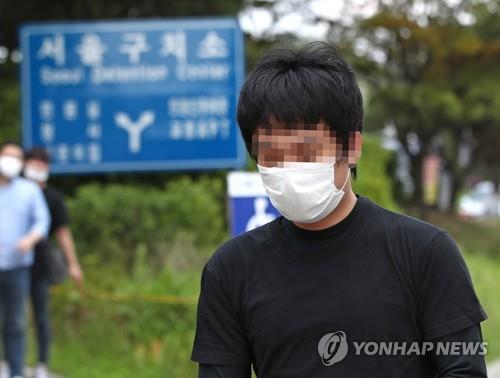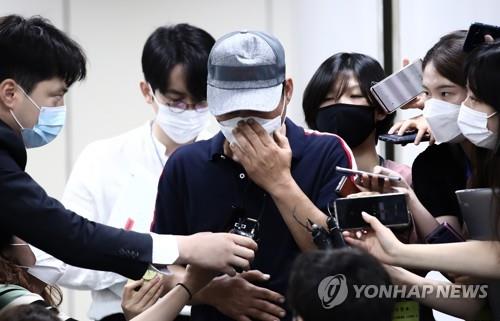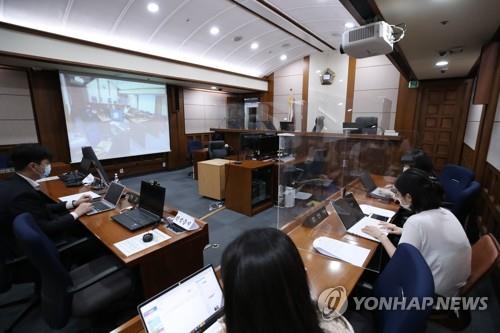- California Assembly OKs highest minimum wage in nation
- S. Korea unveils first graphic cigarette warnings
- US joins with South Korea, Japan in bid to deter North Korea
- LPGA golfer Chun In-gee finally back in action
- S. Korea won’t be top seed in final World Cup qualification round
- US men’s soccer misses 2nd straight Olympics
- US back on track in qualifying with 4-0 win over Guatemala
- High-intensity workout injuries spawn cottage industry
- CDC expands range of Zika mosquitoes into parts of Northeast
- Who knew? ‘The Walking Dead’ is helping families connect
Court rejects extradition request by U.S. for child porn site operator
A Seoul court on Monday denied an extradition request by the United States for a criminal who ran one of the world’s biggest child porn sites.
The Seoul High Court said it decided to reject the request from the United States to extradite Son Jong-woo, the operator of Welcome to Video, which ran on the darknet, inaccessible by regular web browsers, because having him here in Korea would be more helpful for the country’s fight against child pornography.
“It cannot be ruled out that the extradition (of Son to the U.S) could hamper South Korea’s investigation into sexually exploitative content,” the court said, citing that extraditing him would make it harder for Korean authorities, which have been investigating his case, to secure evidence to crack down on illegal content consumers in the country.
“The decision should not be interpreted as exonerating him,” the court said, adding that “Son should actively cooperate with the investigation and face proper punishment.”
The Ministry of Justice said in a statement that it “respects the court’s decision” and that it will undertake follow-up measures with regard to Son’s case, including officially notifying the U.S. of the decision.
Son’s father, who attended the hearing, told reporters that he thanked the court for “the wise decision.”
“I feel sorry for the victims,” he said. “I don’t think it is right to take his side just because he is my son. I will make him accountable for any more sins he has committed.”
About two hours after the court decision came out, Son was released from the Seoul Detention Center located in Uiwang, south of Seoul.



Son Jung-woo is released from the Seoul Detention Center in Uiwang, south of Seoul, about two hours after the Seoul High Court decided to reject his expatriation to the United States on July 6, 2020. (Yonhap)
U.S. authorities have requested the extradition of Son Jong-woo, the operator of Welcome to Video, which ran on the darknet, inaccessible by regular web browsers.
He was indicted by a federal grand jury in the District of Columbia in the United States in August 2018 on nine counts for his operation of the massive child sexual exploitation site.
In the previous two hearings of the extradition case, Son’s lawyer demanded South Korea guarantee that he won’t be punished in the U.S. for producing and distributing child pornography, citing Korea’s extradition laws that rule against double punishment for the same criminal activity.
During the second trial on June 16, Son made an appeal in a court appearance to go through legal processes in South Korea, where punishments for crimes related to child pornography tend to be much more lenient than in the U.S.
The court on Monday acknowledged that there is a lack of relevant laws in the country to punish child sex offenders and that even the existing laws are not strong enough.
“There are critical voices that the country has a much lighter maximum penalty (on child pornography) than the U.S. does,” the court pointed out. “The country’s law enforcement has operated its criminal justice system with a low level of conscience toward sex crimes against minors.”
“But sending a criminal to a country where he or she faces tougher punishment is not the purpose of the convention on extradition.”
Son was arrested in Korea in March 2018 and convicted of generating and distributing exploitative content for fees paid using the cryptocurrency Bitcoin.
During the arrest process, authorities found approximately eight terabytes of child sexual assault videos.
He finished serving an 18-month prison term in April but was taken back into custody since an arrest warrant was issued for potential U.S. extradition.
Son operated the site from June 2015 until March 2018, when it was taken down by law enforcement.
Officials around the world worked together to chase down the site’s users and arrested 337 people, including 223 Koreans. At least 23 underage victims abused by the site’s users were rescued.
In early May, Son’s father filed a complaint against his son for what he argued was a violation of laws that prohibit proceeds from criminal activities from being concealed. The move was widely seen as a bid to stop the extradition by having him face a legal process in Korea.
He is expected to be investigated again in connection with the complaint filed by his father, along with international money laundering charges.
From 2010-2019, the court deliberated on 30 extradition cases and rejected such a request only once in 2013 for a Chinese arson suspect.
The court at that time rejected Japan’s request to hand over Liu Qiang to be prosecuted for an alleged arson attack in 2011 at a controversial World War II shrine in Tokyo, citing that his crime was politically motivated.











